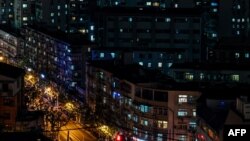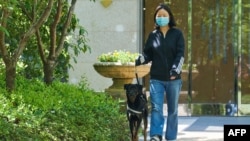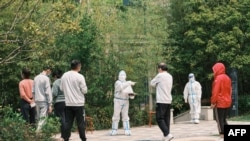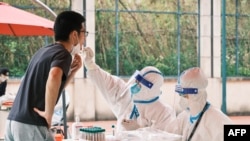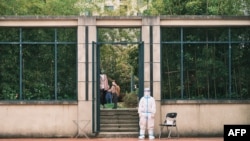Shanghai's bubbly modern mix of sophisticated urban culture and high-flying financial opportunities has attracted expatriates for the past half century. But today, expat residents are experiencing one of the world's strictest anti-COVID lockdowns, a situation that leaves them as frustrated and fearful as their Chinese neighbors.
"I live in fear of getting abducted to central quarantine facilities and being detained there for an undefined amount of time," said Stan, a PhD student who asked VOA Mandarin to use a pseudonym and few of his personal details so he could avoid retaliation by Shanghai authorities.
He arrived in Shanghai four years ago from Europe and has been under lockdown since March 28.
"I am afraid my cat will be beaten up to death by people in white hazmat suits," he told VOA Mandarin by email, referring to reports on social media about officials euthanizing cats and dogs belonging to COVID-positive residents. "I fear (the authorities) will not let me go to the airport and leave this place."
Stan is the only white resident of his building in the Pudong New Area. It's a sector of Shanghai often referred to as "the city of the future" with its skyscrapers, "smart" high-rise homes rising from what were once cabbage fields nearly 40 years ago, and the ambitious goal of having service-rich community centers within a 15-minute walk of every resident, according to New China TV.
But community-focused ambitions go only so far in a lockdown that has people fighting for food. "I am the only foreigner in the building," said Stan, who told VOA Mandarin he is worried about his mental health. "Nobody talks to me."
Of Shanghai's more than 25 million residents in 2020, some 164,000 were foreigners, according to the state-controlled China Daily.
Many foreigners are cut out of the group purchases others have organized through WeChat, a Chinese social media app, for bulk buys of available food and daily supplies. Need milk? There's a chat for that. Ditto vegetables, rice and cooking oil.
Stan said that he was at a disadvantage because he couldn't really read Chinese.
"Placing orders was more difficult for me, and I ended up left behind," he said. Soon, he found himself eating leftovers that "roommates forgot to throw away while moving out."
Stan relies on care packages from his school and the government, a diet of "instant noodles, some fresh vegetables and canned pork. We receive some food from the government but (that's) very scarce and random."
If it weren't for the lockdown, Stan would be finishing his thesis and preparing to return home. But the lockdown left him treading water.
"My productivity is extremely low," he said. "The first week and a half it was because of hunger."
Finding food and water
Scavenging for food and water are top priorities for most people under lockdown, especially for those with children.
Bruce, a professor at a Shanghai university who hails from one of Oceania's island nations, moved to China in 2015 and lives with his wife and two young daughters in a city center compound. He also asked VOA Mandarin to use a pseudonym and only a few of his personal details so he could avoid retaliation from local officials.
"The water in Shanghai is generally not drinkable because of heavy metals," he told VOA Mandarin in a phone interview. To preserve his family's health, Bruce uses the time he is allowed outside his apartment to find bottled water, which he hauls home on a granny trolley.
He and his family are excluded from group baby purchases because there aren't enough babies in the compound to make up a minimum order.
"Baby stuff and water I've never seen in the group buy, so I really literally would not know how we would actually get that," Bruce said of bulk buys. "I think we'd really be stuck regarding those two."
After two weeks of lockdown, Bruce and his family are eating canned foods and instant noodles.
"I haven't had fruit in over a month, and the only fresh vegetables we have are from the government handouts," Bruce said. "But those not very much at all, actually nowhere near enough to feed a family of four."
He wants to leave China with his family. Although the Shanghai airports are open and foreigners are allowed to leave the country, Bruce found that the logistics make departing almost impossible.
For Bruce and his family to leave the compound, the neighborhood committee must issue a special pass for them. The panel nixed Bruce's pass application despite his receiving help from his employer and the embassy of his home country.
At all airports, China requires passengers leaving the country to show a negative COVID-19 test completed within 48 hours of boarding. But arranging an official test at a local hospital and getting the test results in time during lockdown are difficult because the neighborhood committee won't authorize a timely hospital visit, according to Bruce.
Transportation to either of Shanghai's two airports is also a problem, Bruce said. "There is literally no transport to the airport … no subways and buses. There are no taxis. There's no Uber."
The only way to get to the airports is by Airport Shuttle Bus Line No. 1, and the stop nearest to Bruce's home is six kilometers, or about four miles, away.
"We were prepared to go with the baby and a child (and) walk that six kilometers," said Bruce, but the neighborhood committee's failure to issue the necessary permit stymied the family's plans.
'I miss that contact'
For Tom Ward, a 77-year-old American who has made Shanghai his home for 24 years, leaving never crossed his mind. He lives with his cat Nigel on the top floor of a residential building in Grand Plaza, a housing complex of nine buildings in the Puxi area's Jing'an district, a neighborhood known for its preserved pre-World War II architecture and gracious tree-lined streets. During lockdown, his salvation has been tending his private rooftop garden.
Ward longs for his old life.
"I miss being able to go make my own selections for things I want to purchase," he told VOA Mandarin in a virtual interview. "For instance, just outside my gate is a big wet market where I buy my vegetables. The vendor I've been buying from for some 12, 13 years knows me. I go to his stall, and he knows that I like asparagus, so he always puts asparagus in my bag. I miss that contact, the camaraderie with vendors that we have here."
Ward said the lockdown hasn't affected him much because he is able to work from home and chat daily with his friends, locals and expats. He credits his building's management and well-educated residents for getting things done quickly. But his enclave does not represent the rest of Shanghai, he said.
"Go to an older neighborhood, a local neighborhood that doesn't have that management expertise, that (has) older people that don't go online. They don't have online accounts. They don't use the internet. There hasn't been an organized effort to be able to get supplies," he said. "They may not be able to communicate their needs as well."
Because the death rate is low and severe cases are rare, at least by official accounts, Stan, for one, questions the lockdown.
"It is not worth the human suffering it has caused," he said. "The official reason to do it is to prevent the healthcare system from collapsing, but instead they will make the whole country collapse."
Others, pointing to what's happening in Hong Kong, contend that Shanghai officials have taken reasonable steps to protect residents. Hong Kong is reporting an average of 773 new infections each day, according to Reuters, using figures from the region's official Centre for Health Protection. All told, Hong Kong has had 1,199,706 COVID-19 infections and 9,186 coronavirus-related deaths since the pandemic began.
Among 5,906 Hong Kong deaths during the surge of the omicron variant from early January to March 21, 96% occurred in people 60 and older, and of those, 70% were unvaccinated, according to the University of Minnesota's Center for Infectious Disease Research and Policy.
"Those elderly people (in Shanghai) who are very vulnerable and who are not vaccinated, at least for now, many of them are being insulated from the worst of it," said Jacqueline Armijo, a visiting associate professor of history at New York University Shanghai who is also trapped in her apartment. She spoke to VOA Mandarin via Microsoft Teams.
Bruce said that "expats will think twice before choosing to live here in the future, for some time."
Others have more confidence in Shanghai's recovery.
"This is a very strong and vibrant community. It will recover," Ward said. "But there's some pain involved before that full recovery."




